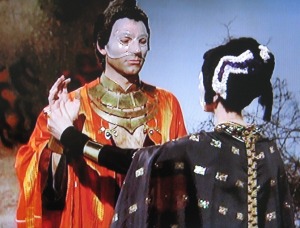Mocked from Day 1?
Monday, February 27th, 2012On 10th September 1963, the day after Wilson announced his plans for a university of the air, at the Labour Party conference (as part of his ‘white heat of technology’ speech) the Daily Mail’s Emmwood (John Musgrave-Wood) poked fun by reference to popular programmes of the period, including Coronation Street.
The Daily Mirror’s Stanley Franklin compared (image not featured here) the plan to the ‘hot air’ talked by the Tories, indicating if not the paper’s support for the OU then at least its continual deriding of the Conservatives. Vicky (Victor Weisz) in the Evening Standard focused on another concern of the period, violence on TV. The cartoons can be found in The British Cartoon Archive is located in Canterbury at the University of Kent’s Templeman Library and online here.




